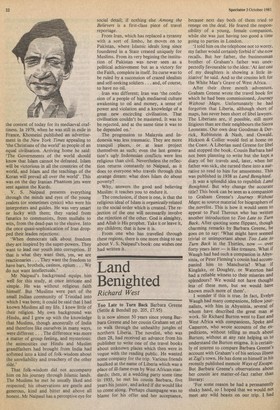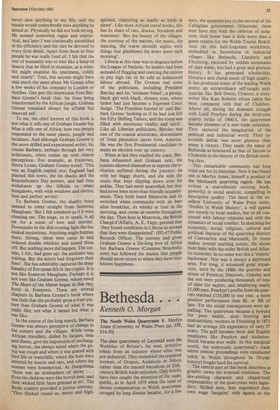Land Benighted
Richard West Too Late to Turn Back Barbara Greene (Settle & Bendall pp. 205, £7.95) It is now almost 50 years since young Barbara Greene and her cousin Graham set off to walk through the unhealthy jungles of northern Liberia. The novelist, who was then 28, had received an advance from his publisher to write one of the travel books about unknown places which then were in vogue with the reading public. He wanted some company for the trip. Various friends baulked at the name of Liberia which was a place of ill-fame even by West African standards; then, at a wedding party some time in 1935, he met his cousin Barbara, five years his junior, and asked if she would like to come along. Perhaps champagne was to blame for his offer and her acceptance, because next day both of them tried to renege on the deal. He feared the responsibility of a young, female companion, while she was just having too good a time going to parties in London.
'I told him on the telephone not to worry, my father would certainly forbid it' she now recalls. But her father, the businessman brother of Graham's father was unexpectedly favourable to the idea: 'At last one of my daughters is showing a little initiative' he said. And so the cousins left for the White Man's Grave of West Africa.
After their three month adventure, Graham Greene wrote the travel book for which he had been commissioned, Journey Without Maps. Unfortunately he had forgotten that Liberia, although short of maps, has never been short of libel lawyers. The Liberians are, if possible, still more litigious than are their neighbours the Sierra Leoneans. Our own dear Goodman & Derrick, Rubinstein & Nash, and Oswald, Hickson & Collier would feel at home on the Coast. A Liberian sued Greene for libel and stopped the book. Cousin Barbara had not been planning to write but she kept a diary of her travels and, later, when her father was sick, she turned these into a narrative to read to him for amusement. This was published in 1938 as Land Benighted.
It was a splendid idea to republish Land Benighted. But why change the accurate title? This book can be seen as a companion to Graham Greene's Journey Without Maps; as source material for biographers of the novelist. This is how it would seem to appear to Paul Theroux who has written another introduction to Too Late to Turn Back. After quoting some flippant, though charming remarks by Barbara Greene, he goes on to say: 'What might have seemed trivial or unimportant about Too Late to Turn Back in the Thirties, now — over forty years later — is like treasure. What if Waugh had had such a companion in Abyssinia, or Peter Fleming's cousin had accompanied him to Manchuria? What if Kinglake, or Doughty, or Waterton had had a reliable witness to their miseries and splendours? We would not have thought less of these men, but we would have known much more of them'.
I wonder if this is true. In fact, Evelyn Waugh had many companions, fellow journalists, with him in Abyssinia, several of whom have described the great man at work. Sir Richard Burton went to East and West Africa with companions, Speke and Cameron, who wrote accounts of the expeditions, without telling us much about Burton; without at any rate helping us to understand the Burton enigma. It is certainly of interest to compare Barbara Greene's account with Graham's of his serious illness at Zigi's town. He has done so himself in his recently published memoir Ways of Escape. But Barbara Greene's observations about her cousin are matter-of-fact rather than literary: 'For some reason he had a permanently shaky hand, so I hoped that we would not meet any wild beasts on our trip. I had never shot anything in my life, and my cousin would undoubtedly miss anything he aimed at. Physically he did not look strong. He seemed somewhat vague and unpractical, and later I was continually astonished at his efficiency and the care he devoted to every little detail. Apart from three or four people he was really fond of, I felt that the rest of humanity was to him like a heap of insects that he liked to examine, as a scientist might examine his specimens, coldly and clearly'. True, but anyone might have said much the same about Mr Greene after a few weeks of his company in London or Antibes. One gets the impression from Barbara Greene's book that, far from being transformed by the African jungle, Graham Greene remained always his affable but reserved self.
To me, the chief interest of this book is not what it tells one of Graham Greene but Vvhat it tells one of Africa: how two people responded to the same places, people and incidents. And although Graham Greene is the more skilled and experienced writer, his cousin Barbara, perhaps through her very artlessness, often comes up with clearer perceptions. For example, at Freetown, Sierra Leone, Graham Greene noted: 'This was an English capital city; England had planted this town, the tin shacks and the Remembrance Day posters, and had then Withdrawn up the hillside to smart bungalows, with wide windows and electric fans and perfect service'.
To Barbara Greene, the shabby hotel seemed to come straight from Somerset Maugharn: 'But I felt somehow as if it were cheating me. The stage, so to speak, is all set for a scene of love and murder. Downstairs in the dim evening light the bar looked mysterious. Anything might happen there. Strong, silent men came in and ordered double whiskies and tossed them off. But nothing more did happen. The curtain, I felt, had gone up; the audience was waiting. But the actors had forgotten their lines'. She has admirably captured the sheer banality of European life in the tropics. It is not like Somerset Maugham. Perhaps it is not even like Graham Greene, whose novel The Heart of the Matter began in that very hotel in Freetown. There are several chapters in Barbara Greene's book where one feels that she probably gives a truer picture than Graham Greene of what it was really like; not what it meant but what it was like.
In the course of the long march, Barbara Greene was always perceptive of change in the scenery and the villages. While some African travellers, dulled by fatigue, heat and illness, give the impression of unchanging horror, she always noted where the going was rough and where it was graced with bird life or waterfalls; where the huts were infested by insects and rats, and where the women were houseproud. At Duogobmai 'there was an atmosphere of decay . . . Even the children were like horrid men, and their wicked little faces grinned at us'. The Buzie country provided a joyous contrast: 'They flocked round us, merry and high spirited, chattering as madly as birds at dawn'. Like most African travel books, this has its share of rats, disease, boredom and weariness: 'But the beauty of the villages, the courtesy of the natives, the music, the dancing, the warm moonlit nights were things that gladdened the heart anew each morning'.
Liberia at this time was in disgrace before the League of Nations. Its leaders had been accused of flogging and coercing the natives to pay high tax or be sold as indentured labour abroad. The Greenes met some of the politicians, including President Barclay and his 'intimate friend', a plump, black girl with black, dreamy eyes, whose father had just become a Supreme Court Judge. 'The President hurried in' said Barbara Greene 'looking as if he had just left the Fifty Shilling Tailors, and the room was filled with enormous vitality and spirit'. Like all Liberian politicians, Barclay was one of the coastal aristocrats, descendants of freed plantation slaves from America. He was the first Presidential candidate to make an election tour up country.
When at last they reached the coast, Barbara exhausted and Graham sick, the cousins allowed themselves to express the irritation suffered during the journey: he with her baggy shorts, and she with the socks that kept slipping down over his ankles. They had never quarrelled; but they had never been more than friendly acquaintances. They both hated Monrovia and its wretched white community with its beer after breakfast, its whisky at four in the morning, and creme de menthe throughout the day. Their host in Monrovia, the British Charge d'Affairs, A. E. Yapp, guessed that 'they found conditions in Liberia so normal that they were disappointed'. (FO 47 Public Records Office). The journey had given Graham Greene a life-long love of Africa but Barbara Greene (Countess Strachwitz now) has followed the maxim that people should never return to where they have once known happiness.







































 Previous page
Previous page